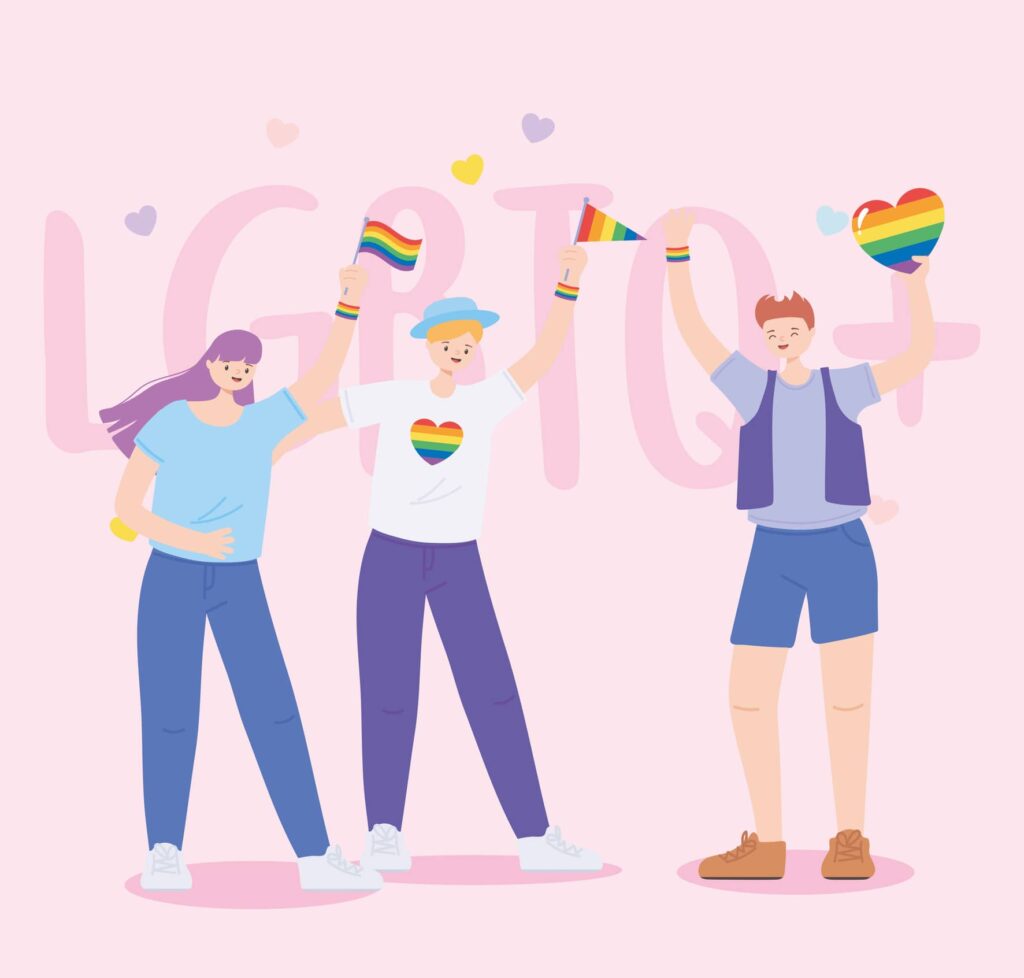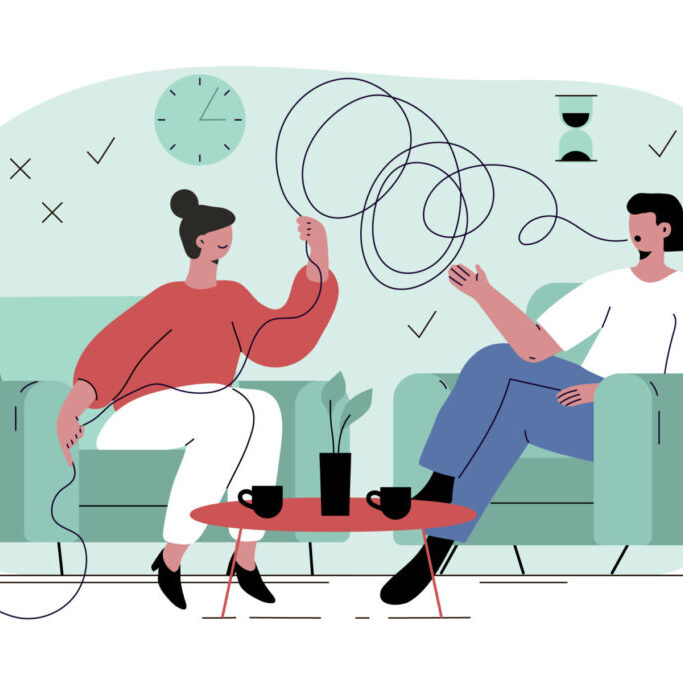Harnessing the Power of Empathy to Overcome LGBTQ+ Challenges and Celebrate Triumphs

Empathy is the bridge between hearts—a force so profound it can change lives. For queer and LGBTQ+ people, navigating a world fraught with stigma, rejection, and misunderstanding can feel isolating. Yet, in the face of these challenges, empathy has the power to heal wounds, foster connection, and remind us of our shared humanity.
Let me be clear – anger is a totally valid and natural response to the unfairness and struggles so many queer people face. It’s a fire fueled by years of rejection, discrimination, and the endless fight for basic rights—and that fire is nothing to be ashamed of. Anger shows you care, that you’re alive, and that you’re ready for change.
In fact, it can also motivate advocacy and action. But here’s the twist: while anger ignites, it’s empathy that heals. Empathy is the game-changer that turns frustration into connection and isolation into community.
For queer/LGBTQ+ folx, embracing empathy—both for yourself and others—takes that fire and fuels something unstoppable: spaces where authenticity, strength, and joy shine brighter than ever.
As a therapist offering LGBTQ-affirming therapy, I’ve witnessed how empathy not only lifts the weight of struggle for those in the LGBTQ+ community but also transforms the hearts of those extending that empathy.
It’s not a one-way street; empathy nurtures everyone it touches. Let’s explore how embracing empathy, alongside individual therapy, can help us confront LGBTQ challenges and celebrate the beauty of each person’s journey.
Empathy: A Lifeline in a World of Challenges
Imagine for a moment, or if you’re queer you probably don’t have to imagine, feeling invisible or judged simply for being who you are. This is a reality for many LGBTQ+ people, who face battles on multiple fronts—whether it’s societal stigma, personal rejection, or even self-doubt. But here’s the truth: empathy can be the salve for these wounds.
Empathy is more than understanding someone’s feelings; it’s stepping into their shoes and sharing their experience, even if just for a moment. For the LGBTQ+ community, it can mean the difference between feeling isolated and feeling seen, between despair and hope.
Through LGBTQ-affirming therapy, empathy becomes a structured, intentional practice, offering a safe and validating space for clients to process their unique challenges.
Empathy Heals Both Ways
I once worked with a client named August (name changed for confidentiality), a transgender man navigating rejection from his family while grappling with discrimination at work. August’s depression was profound—his spirit was weighed down by the crushing sense that no one truly understood him.
But something shifted when his family decided to try empathy. They didn’t get it perfectly; no one does. But they asked questions. They listened. They told August they loved him even as they wrestled with their own discomfort. Through individual therapy, August learned how to navigate these moments with grace and confidence, advocating for himself while allowing others to genuinely try, and he and his family found new ways to connect.
Holding onto resentment, on the other hand, can keep us trapped in cycles of pain, much like the adage says: “Resentment is like drinking poison and expecting your enemy to die.” Empathy offers a way out, replacing bitterness with understanding and opening the door to mutual healing and growth.
Empathy transformed not just August’s life but the lives of those around him. That’s the thing about empathy—it doesn’t just heal the person receiving it. It enriches the life of the one offering it by deepening their understanding of the world and themselves.
Understanding Queer and LGBTQ Challenges: Why Empathy Matters
- The Crushing Weight of Stigma and Discrimination
Every day, many queer and LGBT people carry the burden of societal judgment. Whether it’s subtle exclusion at work or outright prejudice in healthcare, the toll is real and relentless. Research from the Journal of Homosexuality (2021) found that LGBTQ+ people are 2.5 times more likely to experience mental health struggles like anxiety and depression. Researchers of queer mental health agree that this disproportionately is related to social stigmas.
Queer and LGBT affirming therapy provides an essential outlet for people to process the emotional trauma of stigma while developing resilience, boundaries, and effective responses. Meanwhile, empathy from friends, family, and society helps lighten this load by breaking down walls of misunderstanding. When we make the effort to listen and truly see the person before us, we affirm their worth and help them find strength in their journey.
- The Scars of Bullying and Harassment
For LGBTQ+ youth, bullying is a cruel reality. GLSEN’s 2019 National School Climate Survey revealed that 70% of LGBTQ+ students experience verbal harassment. The result? Deep scars of isolation and self-doubt can follow them into adulthood.
Empathy, combined with affirming therapy, doesn’t erase these scars, but it can prevent new ones from forming. By creating safe spaces—whether in schools, workplaces, or families—we show LGBTQ+ kids and teens that they are not alone and that their stories matter.
A Chicago Perspective: Bridging Divides with Empathy
Here in Chicago, LGBTQ+ communities thrive in vibrant neighborhoods like Boystown, Andersonville, and Lakeview. But even in these hubs of acceptance, challenges persist. Racism within LGBTQ+ spaces remains a painful reality, with queer people of color often feeling excluded.
Additionally, some subgroups within the queer community struggle to embrace others, leading to divides that weaken the unity we desperately need. However, queer-affirming therapy and initiatives like the Dyke March and organizations such as Affinity Community Services are working tirelessly to bring queer people together, celebrating every shade of diversity within the LGBTQ+ spectrum.
Empathy is the heart of these efforts. It asks us to look beyond our own experiences and recognize the shared humanity in every person, regardless of race, gender, or identity.
How You Can Use Empathy to Overcome LGBTQ+ Challenges
If you’re wondering how to make a difference, here are ways empathy can guide you:
- Ask Open-Hearted Questions — Set aside your assumptions and ask questions that invite someone to share their truth. A simple “What’s been your experience?” or “How can I support you?” can open doors to connection.
- Truly Listen — When someone trusts you with their story, honor that trust by listening without judgment or interruption. Reflect back on what you hear: “It sounds like that was incredibly painful for you.” This validation can be life-changing.
- Share Your Vulnerabilities — Empathy grows when we connect over shared emotions. If you’ve felt rejected, scared, or alone, share those feelings. Imagine a park bench: weathered, sturdy, and open to anyone who needs to sit for a moment. That bench represents an emotional experience—grief, anger, joy, fear—and it’s big enough for more than one person. You don’t have to have lived the same exact situation as someone else to share that bench.
You may never know what it’s like to come out to an unaccepting family or navigate the world as a transgender person, but you’ve likely felt the ache of rejection, the sting of fear, or the weight of being misunderstood. By sitting on the bench together, you’re not saying, “I know exactly what you’re going through.” You’re saying, “I’ve felt something like this before, and I’m here to sit with you in it.” And sometimes, that shared presence is enough to create a connection and begin the process of healing.
- Validate Their Journey — Even if you don’t fully understand, you can respect a queer person’s experience. Say, “I may not know exactly what this feels like for you, but I’m here to support you however I can.”
- Actively Advocate — Empathy in action is powerful. Support LGBTQ+ organizations, speak up against injustice, and create inclusive spaces in your community.
For many, individual therapy becomes the foundation for learning these empathetic practices in a safe, supportive environment. Don’t be afraid to reach out if you’re struggling to empathize.
How Empathy Transforms Us All
When we embrace empathy, we don’t just help others—we help ourselves. Empathy deepens our capacity for love, expands our understanding of the world, and makes us more resilient in the face of life’s challenges.
One client once told me, “When someone finally saw me—not just as gay, but as me—I stopped feeling invisible. And that made me want to see others too.” This ripple effect of empathy has the power to create a world where everyone feels valued, regardless of their identity.
It’s Your Turn
Empathy is a gift we all have the capacity to give, and its impact is immeasurable. In a world where queer and LGBT people face challenges daily, empathy can be the bridge that connects, heals, and transforms.
Let this be your invitation. Ask the questions. Listen with your whole heart. Stand up for those who need a voice. Seek out LGBT affirming therapy if you or someone you know is struggling because professional support can make all the difference.
When we use empathy to face queer and LGBTQ challenges, we don’t just celebrate queer triumphs—we create a world where everyone, including ourselves, can thrive.
Tandem Psychology is Here for You!
Are you or a loved one navigating LGBTQ+ challenges? Contact the experts at Tandem Psychology to explore LGBT affirming therapy and individual support tailored to your journey. Together, we can create a space where healing and empowerment are possible. You are not alone.
This blog is made for informational and educational purposes only. It is not medical advice. The information in this blog is not intended to (1) replace a one-on-one relationship with a qualified licensed health care provider, (2) create or establish a provider-patient relationship, or (3) create a duty for us to follow up with you.



